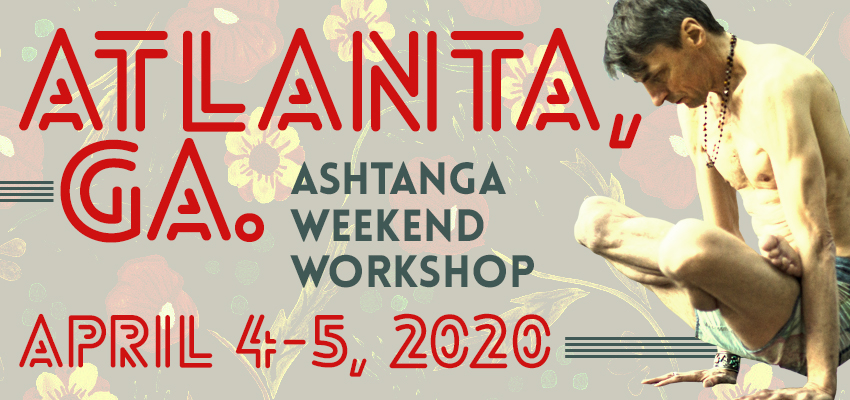
In his workshops David offers a combination both traditional counted vinyasa led classes and clinic style led classes that investigate specific aspects of the practice in varying levels of detail. These important classes feature more verbal instruction; they give students a chance to slow things down, see new ways to orient during practice, get explanations of elusive, often unspoken aspects of the practice, and understand the Ashtanga method in greater, more subtle detail. Mysore, chanting and kirtan classes are also frequently included in a workshop. During the weekend David weaves together studies of asana, pranayama, bandhas, vinyasa, chanting, bhakti yoga, yoga sutra’s and other elements to help develop Ashtanga Vidya (knowledge).
9-11am -- Ashtanga’s Dynamic Dimension
Break
12-1:30pm -- Philosophy Talk: The connection between Ashtanga yoga and Yoga Sutra 1:17
9-11:30 -- Introduction to Second Series
Break
12:30-2:30pm -- Asana Kitchen
This class is a combination of philosophy and asana theory. There is a great art to understanding the subtle progressions of movement that bring you into and out of each asana, exploring this refinement is what brings you into readiness, poise, beauty and alignment in your postures. Vinyasa knowledge is meant to refine your awareness and to see the practice as chiefly dhyana, meditation. In this class we’ll look at how such fundamental postures as Chaturanga Dandasana, Upward Dog, and Down Dog reveal the root techniques that inform the internal practice of Ashtanga Yoga. We’ll explore the intimate connection between the two patterns (Prana and Apana vayus) of the breath and the vinyasa movement system, and also how the role of the bandhas (locks) plays into these core elements of the practice. This class is for everyone from the beginning to advanced student; it will reinforce how the most basic ashtanga practices are both readily accessible and can lead you into the precise refined awareness at the heart of yoga.
Pattabhi Jois intended each student to use the daily ashtanga practice to gradually step towards mastery of all the yogic limbs. First you become established in the practice of Asana (3rd limb) and Pranayama (4the limb) and eventually you become firmly grounded in this practical foundation. It is natural that your focus becomes increasingly more internal and subtle and the further limbs begin to be revealed to you. For example practice helps you gain skill in using your eyes, ears, palate, nose and skin to perceive what is taking place in your body and mind as you perform your postures and focus on breath.
The process of heightened perception through your senses is the subject of the 5th limb called Pratyahara (Recovery (of the senses). Focusing your awareness on diminishing the thought activity that takes place within your mind is the subject of Limbs 6, (Dharana, Concentration) 7, (Dhyana, Meditation) and 8 (Samadhi, Cognitive Absorption). Basic practice prepares you for these limbs as you learn to sustain states of inward awareness through emptying your mind of distractions and increasingly maintaining your attention on chosen objects of meditation.
Yoga Sutra 1:17 formally introduces you to the subject of the 8th limb, Samadhi, by teaching you how to connect with 4 main objects of meditation:
1) Vitarka (Gross)
2) Vicara (Subtle)
3) Ananda (Feelings of bliss)
4) Asmita (Individual sense of ‘I AM’)
This class will include chanting and a discussion of how to use these four forms to develop your skill in hatha yoga techniques and gain knowledge of where you and your practice are situated within the greater context of yoga.
This class is suitable for all levels and will help you to understand the fundamental postures that form the Second Series of Ashtanga Yoga. You will learn about universal back bending principles through working on such postures as Shalabhasana (Locust Pose), Bhekasana (Frog Pose), Dhanursasana (Bow Pose), and Ustrasana (Camel Pose). Using the basic positions to understand back bending principles will teach you how to safely and intelligently work on virtually any back bend posture. Another gift of focusing on back bends is that you can learn to use your spine more expressively and how paying attention to your spinal positioning becomes a central theme in the performance of each posture. The class will also focus on working with such foundational arm balance postures as Bakasana (Crane Pose) and Pincha Mayurasana (Feathered Peacock Pose).
Is there a specific asana that is nagging or troubling you? David Garrigues's Asana Kitchen, based off his popular online video series, is the place to ask very specific questions regarding asanas that have you stuck. Students will write down their specific questions and David will choose several asanas to look at during this class. This class is suitable for the beginning to advanced student.
Possible filming during this class.
27 Waddell Street (STE A)
Atlanta, GA. 30307
Early Bird - $175
Regular Rate - $225
Register at Ashtanga Yoga Atlanta